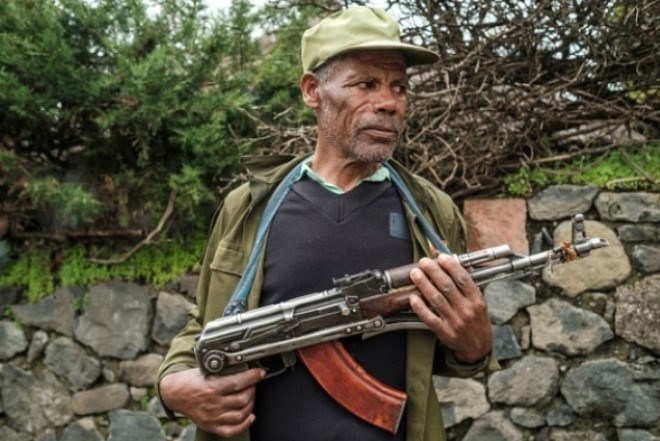
Tuesday November 2, 2021
Government asks people to take up arms as Tigrayan rebel forces are considering marching on Addis Ababa.

A member of the Amhara militia in the city of Dessie [File: Eduardo Soteras/AFP via Getty Images]
Authorities in the Ethiopian capital Addis Ababa have called on residents to prepare to defend their neighbourhoods after rebel forces from Tigray region, who have been fighting the central government for a year, indicated they might advance on the city.
The city administration said in a statement that people should register their weapons and gather in their neighbourhoods, the Ethiopian News Agency reported, news agency Reuters reported on Tuesday.
“Residents can gather in their locality and safeguard their surroundings,” the statement said. “Those who have weapons but can’t take part in safeguarding their surroundings are advised to handover the weapon to the government or their close relatives or friends.”
House-to-house searches were being conducted and troublemakers arrested, according to the city administration.
On Monday night, Tigrayan forces said they had linked up with fighters from an Oromo force also fighting the central government and said they were considering marching on the capital, about 380km (236 miles) to the south of their forward positions. Many political leaders from Ethiopia’s biggest ethnic group, the Oromo, are currently in prison.
The Tigray People’s Liberation Front (TPLF) claimed to have captured several towns in recent days, including the strategic towns of Dessie and Kombolcha in Amhara region, suggesting they were heading closer to the Ethiopian capital.
The capture of Kombolcha, which is on a highway linking the capital of the landlocked nation to the port of Djibouti, would be a strategic gain for the Tigrayan fighters.
Government spokesman Legesse Tulu rejected the claim that the TPLF captured the two northern towns, saying soldiers were still battling for control.
The TPLF had dominated Ethiopian national politics for nearly 30 years but lost much influence when Prime Minister Abiy Ahmed took office in 2018 following years of anti-government protests.
The TPLF has accused Abiy of centralising power at the expense of Ethiopia’s regional states, an accusation he denies.
Abiy said on Sunday that federal troops were fighting on four fronts against the Tigray forces and “we should know that our enemy’s main strength is our weakness and unpreparedness.”
Amid calls on social media for attacks against ethnic Tigrayans, he said “we should closely follow those who work for the enemy and live amongst us.” A new roundup of Tigrayans was seen in the capital on Monday.
The conflict broke out on November 3, 2020, when forces loyal to the TPLF seized military bases in the northern region of Tigray and the government responded by sending more troops.
The war has destabilised Africa’s second-most-populous nation, considered a stable Western ally in a volatile region, plunging about 400,000 people in Tigray into famine, killing thousands of civilians and forcing more than 2.5 million people to flee their homes.